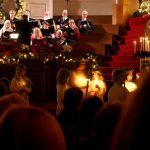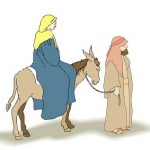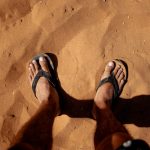What comes to mind when you see the words, the sound of music?
The movie ‘The Sound of Music’ in which Julie Andrews starred, made an amazing impact worldwide. More than fifty years on it still has a warm effect on many who view it.
The Power of Music
Music has a profound effect on one. It has the power to lift us out of depression. Its rhythm soon gets one’s feet a-tapping.
According to the Newport Academy, music has a direct impact on areas of the brain related to our emotions. It is further believed that changes in music can directly influence our reactions—for instance, if a new instrument is introduced, or there is a change in pitch, volume, or tempo.

Photo by Alena Darmel from Pexels
The above picture reminds me of a Britain’s Got Talent semi-final concert that Shirl and I watched a week or so ago on TV, in which a father and son team got through to the final. It was a delightful episode, featuring wonderful chemistry between the dad and his boy.
Praying to Music
The third chapter of Habakkuk opens with Habakkuk’s prayer accompanied by a musical instrument.
Habakkuk 3:1 NIrV
‘This is a prayer of the prophet Habakkuk. It is on shigionoth….’
Habakkuk chapter 3 has been described as “a Psalm Blessing for God’s faithful acts of deliverance in the past and hope for deliverance in the future.” (Commentary by Bob Utley)
- Have you attended a service where a musical background is used as part of the service?
In the services that Shirl and I attend, the pastor often comes up to the rostrum during the singing of a song of praise and prays while a musical instrument continues to play softly in the background. It is beautiful.
Music on a Shigionoth
Habakkuk prayed using a Shigionoth. I knew you were going to ask that! I had to look it up.
“The word denotes a lyrical poem composed under strong mental emotion; a song of impassioned imagination accompanied with suitable music.” (Illustrated Bible Dictionary by M G Easton)
The Easy English Commentary states, “The book ends with a psalm (a song with music)! Habakkuk may have worked with one of the music groups in the temple in Jerusalem. He tells them what music to use, and what *musical instruments,” (verses 1 and 19).
- What comes to your mind as you focus on Habakkuk 3 verse 1?
It should not seem strange to us that the verse refers to a sung prayer. We often sing what we know as the Lord’s Prayer. Many of our hymns and worship songs are based on the words of the Psalms, many of which are themselves in the form of a prayer.
In the 1960s, many passages of scripture—particularly the Psalms, were set to music and sung in churches that had come under the influence of the Charismatic Movement.
- Are you more conservative and prefer the good old traditional hymns?
- How do you react to the ‘new’ songs that seem to be replacing those great hymns?
- How do you feel about traditional hymns set to new melodies or rhythms?
Several of the psalms actually encourage worshipers to sing new songs to the Lord (Psalms 33:3; 96:1; 98:1; 144:9; 149:1)
“Tell the whole world to sing a new song to the Lord! Tell those who sail the ocean and those who live far away to join in the praise.”(Isaiah 42:10 CEV)
A Joyful Noise
In the last session, we focussed on the need to come into God’s presence in an attitude of humility and reverence. Here in this verse, the emphasis is our need to praise God, to vocalise our appreciation for whom He is and what He has done.
Many are afraid to sing out because they have not been blessed with a good musical tone. Praise God! That doesn’t worry Him. He just wants your praise.
Did you know that seven psalms recorded in the King James Version of the Bible encourage us to make a joyful noise to the Lord? Several other translations encourage us to praise God with shouts of joy.
Noisy Worship?
This brings to mind the 2010 World Cup held in South Africa. This proved to be a unique experience for those who attended the matches or watched the games on TV. Not only were they part of a huge cheering crowd, but the African element introduced the constant noise of the vuvuzela.
The vuvuzela is a plastic brightly coloured horn. When blown its sound is like a hunting horn, but when blown by a stadium of football fans it sounds more like a trumpeting elephant.

Image of Vuvuzela by M W from Pixabay
The psalms certainly indicate that Old Testament Temple worship was surely a noisy affair. When one considers the variety of musical instruments mentioned in some of the psalms accompanied by a loud singing crowd the din must have been audible from miles away.
Songs and Instruments of Praise
The following psalm encourages joyful worship:
Shout praises to the LORD, everyone on this earth.
Be joyful and sing as you come in to worship the LORD!
Be thankful and praise the LORD as you enter his temple.
The LORD is good! His love and faithfulness will last forever. (Psalm 100:1,2,4,5 CEV)
In addition in Psalm 150, we have a list of some of the instruments used in the Temple worship: trumpets, all kinds of harps, tambourines, stringed instruments and woodwinds, cymbals and clashing cymbals. (Verses1-6 CEV)
A shofar, a musical horn made out of a ram’s horn, was also used and is still used for Jewish religious gatherings.

Shofar image by faherneit451 from Pixabay
Revelation records that at the second coming of our Lord. He will stand on Mt Zion and the sound coming from heaven will be like, ‘a roaring flood or loud thunder or even like the music of harps. And a new song will be sung in front of God’s throne…” (Revelation 14:1-3 CEV)
Revelation reveals that heaven reverberates with worshipful praise. What prevents you from joining in uninhibited worship of our amazing loving God?
Spend some time thanking God for the priviledge of being able to communicate with him How about joining in this new song which is becoming well known, and worship the Lord now?
P.S.
If you haven’t yet read the background to the prophecy, please do. It will benefit you throughout this series of studies.













